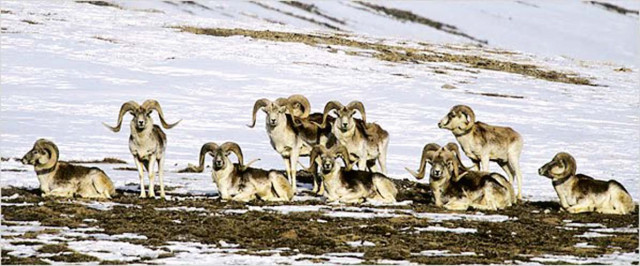Khunjerab National Park: a failed project
Shimshali people seek more say in KNP management; claim top-down govt policy unworkable.

The establishment of Khunjerab National Park (KNP) is one of the many examples of how authorities have overlooked local wisdom to impose their own convoluted plans and decisions on people, depriving them of their resources, land and ultimately of their rights.
It was in 1975 that then Prime Minister Zulfikar Ali Bhutto through an ordinance established the park in Khunjerab valley but later it was extended to the Shimshal valley situated at the Sino-Pakistan border. The purpose of establishing the park was to protect the endangered species especially the Marco Polo Sheep.
George Schaller, a zoologist, was the person who, after a brief survey, had recommended the establishment of the park under the IUCN Category II, prohibiting all human intervention within the park area, including livestock grazing and hunting. The park boundaries included parts of Shimshal’s 2,700 square kilometres of traditional pastures.
The inclusion of major chunk of Shimshal valley in the park came as a shock to the people as they were not consulted in the matter which meant the local people would have to give up their rights on 90 per cent of their land which had been their source of livelihood for centuries.
Meanwhile a number of non-governmental organizations (NGOs) backed the government in devising a ‘suitable’ management plan to ‘conserve’ the park’s fauna and flora and generate income for the communities.
The plan failed to meet its objective. Illegal hunting of Marco Polo sheep by civil and military bureaucracy and ‘influential’ people increased in Khunjerab area. It resulted in greatly decreasing the population of Marco Polo sheep in their natural habitat. “The number of the sheep went down from 800 to merely a few dozens during 1975 to 1993,” said an official of SNT (Shimshal Nature Trust), an organization of Shimshali people formed in 1997 to counter the plan and prepare a parallel management plan based on the centuries-old wisdom of the local people and preserve endangered species.
The SNT is an umbrella organization and works for the interests of the valley here and abroad. According to the former SNT chairman Ghulam Amin, the establishment of the park has not only perturbed the routine life of the people but also affected the wildlife. “The population of blue sheep has grown out of proportion due to ban on hunting,” the incumbent chairman of the trust, Muzafaruddin said, adding that over the years it has resulted in the outbreak of diseases in the area among livestock and the wildlife, leaving hundreds of the precious animal dead.
Based on their collective wisdom, the locals believe that the population of the sheep has increased to 30,000 since hunting was stopped.
They believe that if the natural level of hunting had been allowed, the large scale casualties among the wildlife wouldn’t have happened.
The Shimshalis stuck to their position on the controversy through peaceful means. They called for lowering the status of the park to a category where conservation and development could go hand in hand. “Our inclusion in the park is only possible if the category of the park is lowered and we are allowed both the conservation and development in our land,” said the SNT chairman.
The Shimshal community of nearly 2,000 inhabitants depends entirely on farming and livestock for their sustenance, inhabiting the valley for nearly six centuries.
Having remained cut off from the rest of the world for centuries, the valley was finally linked with the outside world through a narrow road that was constructed in 2003. Before that it was a three-day trek from the Karakoram Highway near Passu to the valley which lies at an altitude of 3,500 meters above sea level.
“Our culture, which is nearly 600 years old, is comparatively still in a pristine form because of Shimshal’s isolation,” said the chairman.
Under SNT, the Shimshalis have undertaken a number of activities to prove the community’s worth. “We have gradually enforced a ban on hunting in different zones and are willing to extend it to the entire area, except for the seasonal herders who are stranded beyond the Shimshal Pass for six months,” the chairman said, adding that some other initiatives that they have been conducting under SNT are Self Help Village Development Programme, Shimshal Culture Programme, Visitors Programme and Mountaineering School etc.
As plans are afoot to establish another park -- Central Karakoram National Park (CKNP) -- Shimshalis hope the parties involved must have learned from the experience of KNP and decided to adopt a community-based planning and management procedure. They are of the firm belief that their culture and natural surroundings are best served by a proactive nature stewardship programme in Shimshal’s context, whose design is entirely indigenous.
Although Shimshalis have so far resisted KNP management, they fear continued external pressure can jeopardise their centuries-old culture and the wildlife. The evidence that endangered wildlife is more plentiful in Shimshal territory than in areas currently under park management vindicates the community’s stance against government’s policies.
The recently passed 18th amendment too has failed to impress the authorities as KNP continues to be a major stumbling block in devolution of power to the local grassroots institutions such as Shimshal Nature Trust (SNT).
The government has setup a full-fledge department for KNP with a director spearheading it. But what is surprising is that contrary to their mandate and lofty claims of participatory approach, influential NGOs like World Wide Fund for Nature (WWF), World Conservation Society (WCS) have so far toed the government policies, tightening noose around the Shimshalis to have them accept the status of park.
“If there is any issue between the Shimshalis and KNP management, that will be resolved as we are in contact with each other,” said Wilayat Noor, who has recently joined KNP as director. He talked of the benefits of the establishment of the KNP saying that one hunt of a trophy size animal is allowed in the Shimshal.
The official however has no knowledge of the epidemic that left several blue sheep dead some eight years ago nor was he aware of any foreigner’s assistance to find root cause of the epidemic.
Published in The Express Tribune, June 27th, 2011.



















COMMENTS
Comments are moderated and generally will be posted if they are on-topic and not abusive.
For more information, please see our Comments FAQ